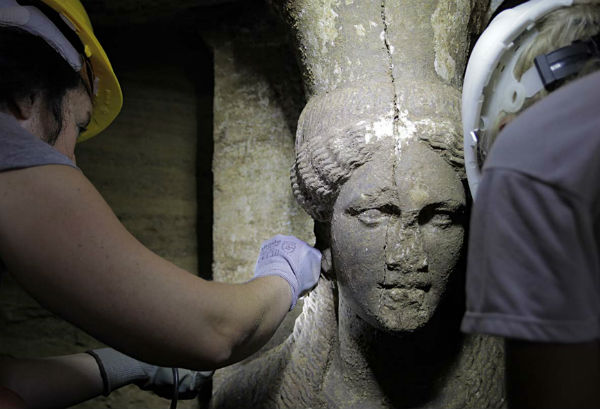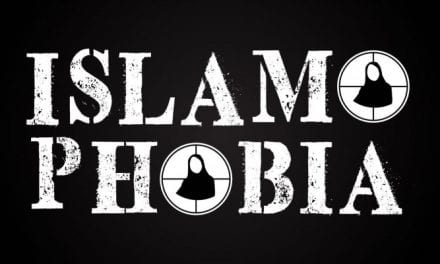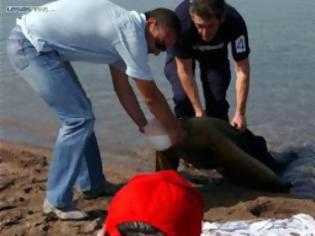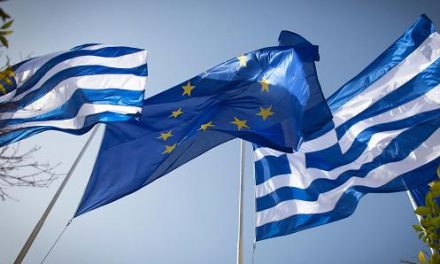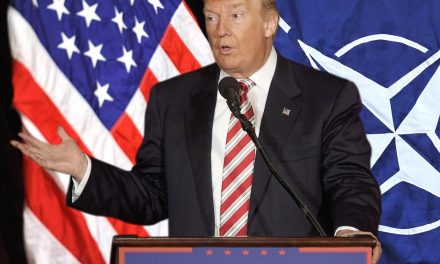PYLOS, Greece – Marble statues are nothing new in Greece. Recently uncovered in the northern Greek town of Amphipolis are a couple of elaborately sculpted, fully hair-braided caryatids standing at the entryway to an elaborate Alexander the Great-era tomb.
Farther south, in the current Greek prime minister’s hometown situated on Navarino bay, the most notable monument in the quiet central square is a memorial dedicated to three Western military commanders who fought more recent battles than Alexander’s.
It is a maritime-adorned obelisk dedicated to three admirals who sailed to Greece to take on the Islamic caliphate. A few hundred yards away is where a coalition of Western powers made up of British, French and Russian naval forces entered the bay and destroyed the formidable occupying Ottoman fleet. The year was 1827 and it led to Sultan Mahmud II, self-proclaimed caliph, spiritual leader of all Muslims, declaring an ultimately unsuccessful jihad, or holy war, on European powers.
It is easy to draw parallels between those battles and today’s struggle against the Islamic State. Western success catalyzed Greece’s liberation and the eventual downfall of the Ottoman Empire.
Greece was then, as it is now, on the front line of the struggle between the West and an illiberal Near East that is increasingly radicalized, capitalized and violent. Now, as then, Greece is bearing a disproportionately greater Western burden in this battle.
Greece’s burden is greater than for any NATO ally or European Union member state as the country tries to deal simultaneously with devastating economic challenges at home and the reality of its porous borders and immigrant flow.
Economically, the country is living in an age of imposed austerity and structural reform. According to the European statistical bureau, Greek debt stands at 174.1 percent of its GDP. Roughly speaking, for every dollar Greece earns, it owes $1.74. This is not a formula for growth.
Because the Greek economy was bailed out, lending institutions oversee and over-squeeze an already suffocating Greek economy. Youth unemployment stands at nearly 60 percent and the rising social tension accompanying lowered pensions, high prices and a contracting economy is palpable.
These tensions are especially felt in the capital, Athens, where increasingly visible, volatile and impoverished illegal immigrant communities have taken over entire neighborhoods. Ever since the wars in Iraq, Afghanistan and Syria began, and with the growing unrest in the region, migrants have sought entry to the EU through Greece. Arguably the least able country, Greece is disproportionately saddled with the costs of EU immigrant services.
As many as 90 percent of Europe’s irregular immigrant entries came across Greek borders or over its waters – mainly by traversing an enabling Turkey next door. Around 10 percent of the Greek population is made up of foreign nationals, many of them intending to slip into other EU countries to work, but forced to remain in Greece by EU law.
The result? Increasing pressure on the government, with citizens channeling their resentment and anger via protest votes. An anti-immigrant extreme right party has made enormous gains in Greece, though nowhere near those of France, Hungary or Sweden. A relatively new, populist radical left party could potentially win national elections today.
Despite all these pressures, Prime Minister Antonis Samaras is optimistic about Greece’s prospects and its slowly improving economics. Accentuating the positive and his successes, he said that “for the first time, Greece now has a current accounts surplus.”
Samaras and I met by chance at a restaurant at Costa Navarino, a resort near his hometown of Pylos where he briefed me on the country’s outlook and his deepest concerns. In this unstable environment, Samaras said the opposition could force snap elections this spring – an act he equated with “suicide” – and that an opposition-led government would result in “no more NATO” and “no more euro” currency. He emphasized Greece’s geostrategic location and the important role it plays as a “stable democratic country in a turbulent region,” and that his country “is so close to the volcano.”
The Islamic State volcano is erupting nearby, but Greece remains placid. So peaceful, in fact, that in 2014, a record 22.5 million tourists voted for Greece’s stability and helped support its economy. Greece remains an island of stability in the wildly volatile southeast Mediterranean.
Nearby, however, as the Islamic State takes hammers and dynamite to cultural monuments throughout Greece’s failed-state neighborhood, the glee of destruction contrasts dramatically with the loving archaeological brushes dusting off sculpted female torsos. Samaras had just been to the Amphipolis excavation site and said, “It is magnificent! It is the greatest archaeological find in years.”
As a new Western coalition fights the latest self-declared caliphate state in Iraq and Syria, it needs to be reminded that significant pre-emptive support of front-line, Western-anchored Greece is a good insurance policy – both for marble statues and fragile governments.
Markos Kounalakis is a research fellow at Central European University and a visiting fellow at the Hoover Institution. Contact him at markos@stanford.edu and follow him on Twitter @KounalakisM.

